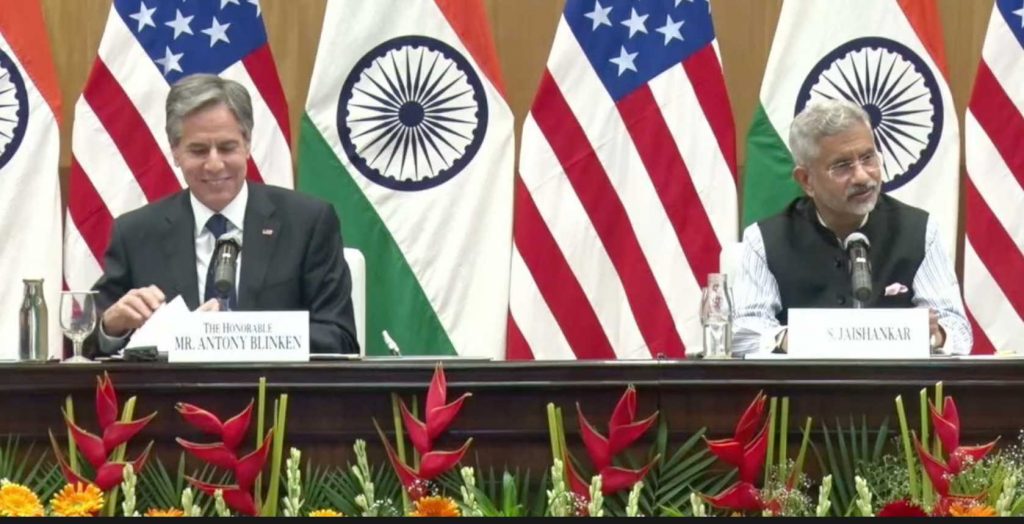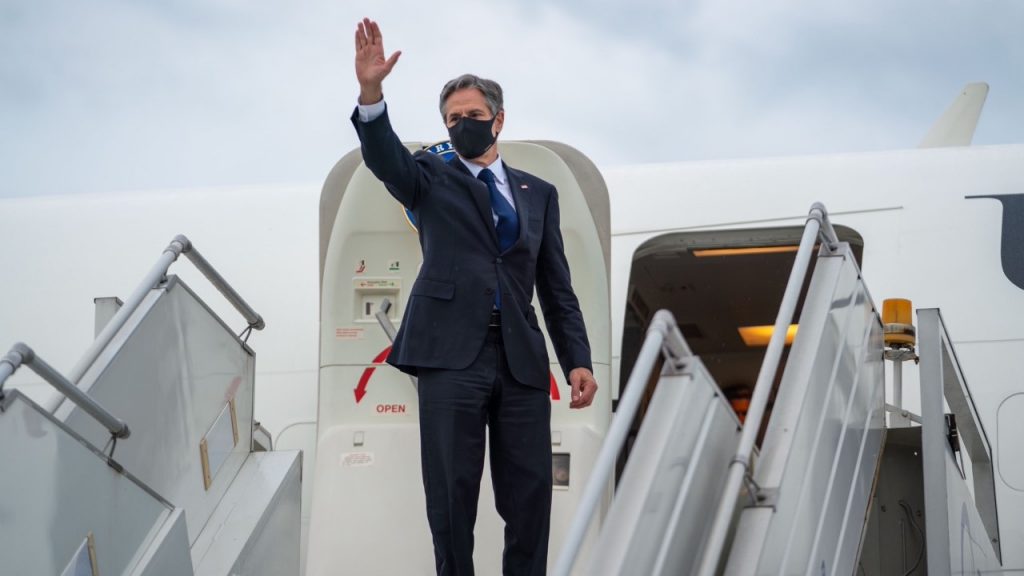
Coronavirus response topped the agenda even as Indian Foreign Minister S. Jaishankar and the US Secretary of State Antony Blinken discussed a host of global and regional issues in their bilateral meeting held in New Delhi on 28th July. Let’s look at the highlights from their press meet that followed the India-US Ministerial Meeting.
On COVID-19 Response
Mr. Blinken thanked India for its support in the early days of the pandemic and assured US collaboration in vaccine manufacturing and distribution. The US, which had contributed 200 million dollars towards COVID-19 relief efforts in India, will give an additional 25 million dollars towards strengthening supply chain logistics, training the healthcare workers, and addressing the vaccine hesitancy, added Mr. Blinken.
Mr. Jaishankar thanked the US for keeping the supply chains open for the raw materials needed for vaccine production. The meeting also discussed how to make the vaccine globally accessible and affordable, said the Foreign Minister.
Addressing the COVID-19 related travel restrictions, Foreign Minister Jaishankar hoped the US, which has been forthcoming about students, would take a sympathetic view of other travelers from India to the US.
Afghanistan – The Path ahead
Secretary Blinken’s visit also comes just weeks after the US had withdrawn its troops completely from Afghanistan. Amidst reports of Taliban advances in the country, both India and the US stressed the need for a peaceful dialogue led by Afghanistan itself, without any ‘malign influence.’
Condemning the violence in Afghanistan, Secretary Blinken stressed that the Taliban, which is now seeking international recognition and removal of sanctions, must understand that the only path forward is at the discussion table. Although the American forces are withdrawn, the US remains engaged in Afghanistan with the presence of a strong embassy, diplomacy, and other programs supporting the country said Mr. Blinken.
The QUAD
Responding to the questions from the reporters, the US Secretary of State sought to clarify that the Quad (Quadrilateral Security Dialogue constituting India, Australia, Japan, and the US) is not a military alliance, but it means to pool resources, and to advance cooperation on regional challenges, while reinforcing international rules and values that both nations believe, to underpin peace, stability, and prosperity in the region.’ The QUAD is doing that also in cooperation with ASEAN and other like-minded countries.
Speaking of QUAD, the Indian Minister pointed out that countries with intersections of interests work together and quoted ‘BRICS’ (Brazil, Russia, India, China, and South Africa) as an example and said that anyone considering this as being done against them, must get over it. Mr. Jaishankar said the discussions held under the purview of the QUAD included counter-terrorism, cyber concerns, building resilient and reliable supply chains, connectivity, Infrastructure, climate action, and education.
Action on Climate Change
A continued commitment towards the PARIS climate goals was expressed by both nations, as they discussed the 2030 goals set by the Indian Prime Minister Narendra Modi and the US President Jo Biden, as discussions focused on ‘India-US Climate and Clean Energy Agenda 2030.’ The Agenda focuses on the US cutting its greenhouse emissions by half and India setting up 450 gigawatts of renewable energy.
On Trade
Also came up for discussion at the India-US Ministerial Meeting were trade and investment, Education, and Innovation. Speaking on trade, Secretary Blinken said that given the right conditions for trade, there is no limit to what the two countries can achieve.
Friendships, Shared Visions and Challenges
Both Secretary of State and the Foreign Minister reiterated the close relationship between the US and India, with Mr. Blinken saying that ‘few friendships are more vital than the India-US’ and that the ‘diversity in the two countries fuels our national strength.’
‘Indian and American people are also united by millions of family ties stretching back generations,’ he said.
While stressing the shared visions of Democracy and Values, the US Secretary of State acknowledged the challenges that are to be met and said both countries had not reached the ideals they set for themselves. Adding to what Mr. Blinken had said, the Indian Foreign Minister said the quest for a perfect union is common in all democracies and that India values the important fundamental freedoms, but Freedom must not be equated to a lack of governance or poor governance.
What else happened on the US Secretary of State’s trip?
US Top Diplomat meets a representative of Dalai Lama
Earlier on July 28th, before the Ministerial Meet, the US Secretary of State met with the representative of Dalai Lama, when he met a group of civic leaders. This comes less than two weeks since Chinese President Xi Jinping had recently made a visit to Tibet.
Following the meetings with civic leaders and Indian Finance Minister Jaishankar, Mr. Blinken met Prime Minister Narendra Modi in the evening and discussed the strategic partnership between the US and India.
PM Modi and US President Jo Biden have remotely participated in programs such as G7 and Climate Leaders this year and have spoken multiple times.
Later, the US Secretary of State Antony Blinken had an interaction with staff and guests at the US Embassy in New Delhi before departing to Kuwait. The Indian Foreign Minister S. Jaishankar will visit the US later this year.
